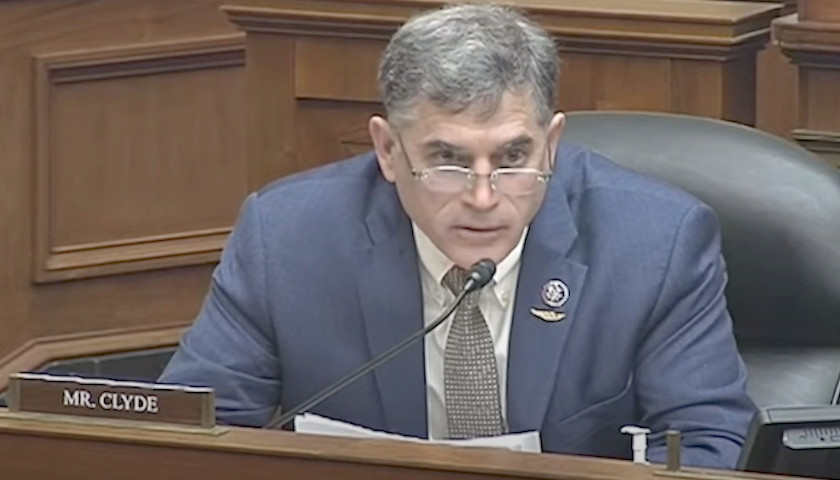Representative Andrew Clyde (R-GA-09) this month shared how Internal Revenue Service (IRS) agents violated him and his rights several years ago, and he proposed new ways for the agency to reform itself.
Clyde made his remarks at a House Oversight and Reform Subcommittee on Civil Rights and Civil Liberties hearing.
The congressman said IRS agents seized more than $940,000 of his in 2013 — without warning and without ever charging him with a crime.
“How on Earth does the Internal Revenue Service or any other government agency have the power to seize one’s property without charging a person with a crime? It should not. But the IRS had been wrongfully confiscating money from individuals and small business owners across the country through civil asset forfeiture. Specifically, they were accusing people of structuring their legally earned cash bank deposits and that is exactly what they did to me,” Clyde said.
“In my case, the Internal Revenue Service offered me a deal to give back two-thirds of the $940,000 of my legally earned money if I would forfeit one-third to them as a penalty. They wanted me to voluntarily forfeit $325,000. Even though they admitted in writing that all the money was legally earned and properly reported, in writing. This was nothing short of extortion and I refused.”
Clyde said that IRS agents threatened him with criminal prosecution to get a civil monetary settlement, which he called “a violation of legal ethics.”
“And, again, I refused because I had done nothing wrong. Long story short, I fought the Internal Revenue Service in court and eventually had my money returned, but it cost me $150,000,” the congressman said.
“Unfortunately, too many Americans do not have the ability or the resources to take on the government, especially the Internal Revenue Service and they wound up losing their businesses and their livelihoods.”
Clyde said his previous testimony before Congress on the matter prompted legislators to enact the Clyde-Hirsh-Sowers Respect Act. That legislation, the congressman went on to say, protected individuals and small businesses from the IRS and its unlawful cash seizures.
The congressman said he wants new laws that bolster reporting requirements and data tracking of assets seized so that members of Congress can know whether law enforcement applies civil forfeiture fairly to all citizens.
“I want to see every person wronged by civil asset forfeiture abuses made whole again,” Clyde said.
“We must have a better reporting system to have that happen. Is there a way to retroactively right these wrongs?”
Clyde last month announced he plans to run for re-election in Georgia’s Ninth Congressional District.
This, despite members of the Georgia General Assembly recently drawing him out of his current seat and into the newly vacant 10th District.
– – –
Chris Butler is an investigative journalist at The Tennessee Star. Follow Chris on Facebook. Email tips to [email protected].






Typical congress criminal. If you’re going to pass a law making civil asset forfeiture a crime, why not, while you’re at it, make the individual agents of government personally liable for damages, and make the agency/agents liable for legal costs as well.
It isn’t as if this sort of thing is not blantantly unconstitutional from the beginning, even if the “supreme” court ruled otherwise. Say, how much of the confiscated money goes to fund law enforcement promotions, bonuses, equipment buys and the like? How much makes it way to officers of the court? Is there a ledger available for auditing?
Why the hell not?